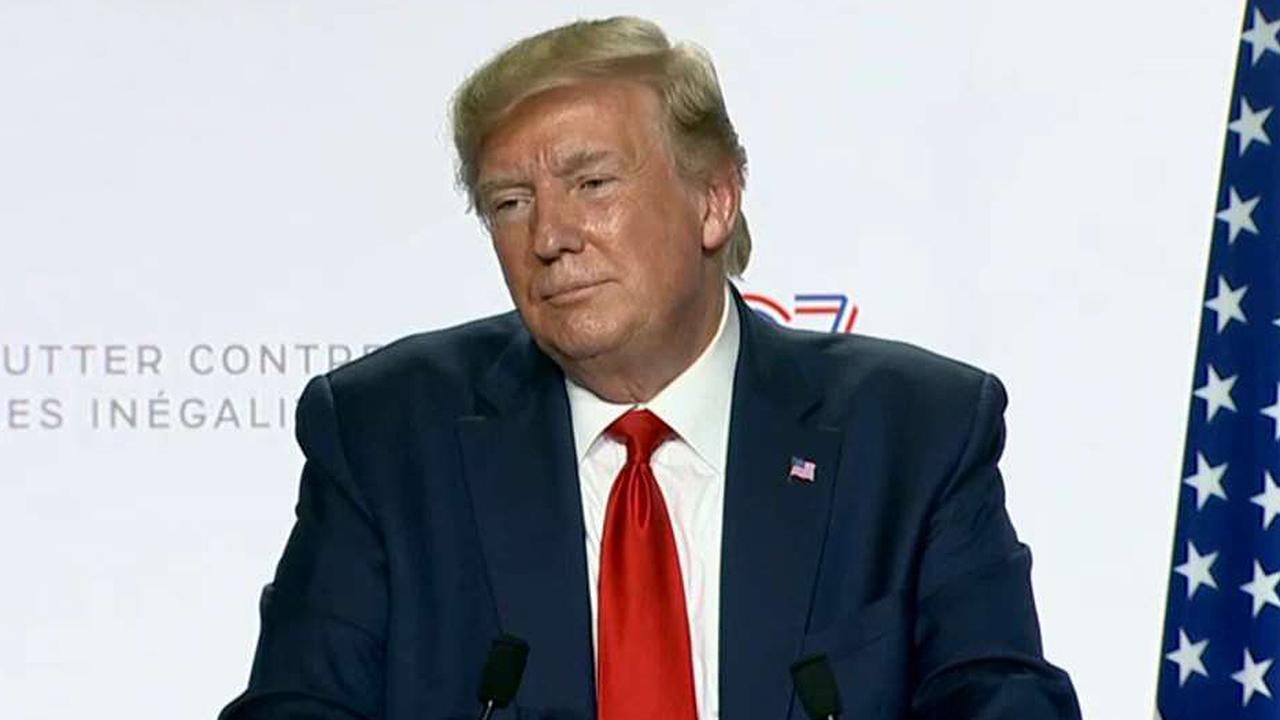 Beyond Meat uses technology to make products that hew closely to the taste and texture of meat. (Daniel Acker/Bloomberg News)
Beyond Meat uses technology to make products that hew closely to the taste and texture of meat. (Daniel Acker/Bloomberg News) August 25 at 2:35 PM
Tofurky wasn’t keeping cattle ranchers awake at night.
For decades, veggie burgers were the token offering to vegans at the backyard barbecue, and Tofurky was the Thanksgiving benediction to the meat-free loved ones in our lives.
But as plant-based meat goes from an afterthought to a financial juggernaut that aims to change how most people eat, the opposition has suddenly awakened: Many of the country’s 800,000 cattle ranchers have declared war on newcomers Impossible Foods and Beyond Meat, which use technology to make products that hew closely to the taste and texture of meat, and now “first-generation” veggie burgers and similar products are caught in the crossfire.
In 2019, officials in nearly 30 states have proposed bills to prohibit companies from using words such as meat, burger, sausage, jerky or hot dog unless the product came from an animal that was born, raised and slaughtered in a traditional way. Arkansas, Louisiana, Mississippi, North Dakota, South Dakota, Oklahoma and Wyoming have already enacted such laws. In Missouri, the first state where the ban took effect, violators incur a $1,000 fine and as much as a year in prison. Mississippi’s new law is sweeping: “Any food product containing cell-cultured animal tissue or plant-based or insect-based food shall not be labeled meat or as a meat product.”
The states, in most cases backed by cattlemen’s associations, claim consumer confusion as the driving force for the laws. The newest offerings, they say, cross a line when they make unsubstantiated health claims (many have long lists of processed ingredients and are high in sodium) and when the packaging is unclear.
“Beyond Meat Beefy Crumbles has a picture of a cow on the front and says ‘plant-based’ in very small lettering at the bottom,” said Mike Deering, a cattle rancher and the executive vice president of the Missouri Cattlemen’s Association. “I’m a dad and I’m going through the grocery store before one of my boys has a meltdown, and [if] I pick up that package that says beef with a picture of a cow on it, I’m going to buy it.”
This isn’t quite a David vs. Goliath fight. The cattle associations have enormous political power, and several of the top veggie brands such as Morningstar Farms and Boca are owned by food giants such as Kellogg and Kraft Heinz. Notably, the major meat processors — Tyson Foods and Smithfield Foods, for instance — aren’t taking sides, relying on the ranchers for traditional meat but also investing heavily in these new alternatives they believe consumers increasingly desire.
The future of ranching faces a big threat if plant-based meat, thought to be much better for the environment, becomes a mainstay of the American diet.
Traditional animal agriculture is looking to the lessons learned by the dairy industry, which saw cow’s milk sales dwindle by $1.1 billion last year, much of that business scooped up by alternative milks such as almond and oat. And as the stock price of Beyond Meat, which went public this year, has soared, some of the biggest retailers and restaurants in America have got on board with plant-based alternatives.
[In a crowded field of big-name IPOs, Beyond Meat emerges as the surprise MVP]
In September, Impossible Burgers roll out in grocery stores. Subway has announced meatless meatballs, Carl’s Jr. and sister company Hardee’s have gotten on the meatless meat wagon, Dunkin’ introduced its Beyond Sausage breakfast sandwich and Burger King expanded the reach of its Impossible Whopper to all franchises.
 In September, Impossible Burgers will be available in grocery stores. (Robyn Beck/AFP/Getty Images)
In September, Impossible Burgers will be available in grocery stores. (Robyn Beck/AFP/Getty Images) On July 22, Tofurky joined forces with the American Civil Liberties Union, the Good Food Institute (a nonprofit that promotes plant-based meat) and the Animal Legal Defense Fund to file a lawsuit claiming Arkansas’ new labeling law, which went into effect July 24, violates the First and Fourteenth amendments.
“If we lose, there’s something wrong with our judicial system,” said Tofurky chief executive Jaime Athos. “The first thing to get out of the way is that people are confused. It’s all [the cattlemen’s associations] can come up with to censor speech.”
[One thing might keep the Impossible Burger from saving the planet: Steak]
He said there is mandatory court-ordered mediation because the two sides have failed to reach an agreement. If Tofurky loses, plant-based meats will have to be repackaged to reflect approved nomenclature, an expensive endeavor for a national company that sells to all 50 states. The bigger issue, Athos said, should focus on the emerging science about the benefits of a plant-based diet.
“The meat industry’s chickens are coming home to roost. Their industry was propped up by agricultural subsidies and misrepresented the true nutritional value and necessity of meat in the American diet,” he said. “We know better. These are not healthy things.”
Despite being dragged into the fight, Athos said he’s not miffed at what’s transpired.
“When it comes down to it, we’ve undertaken a monumental task and we now have partners to help us achieve those goals,” he said. “What a great thing to be able to live your values. What we’re seeing with plant-based is the conversation shifting from ‘why’ to ‘why not.’ ”
[From lab to table: Will cell-cultured meat win over Americans?]
There are reasons for Athos to be sanguine. Tofurky has seen year-over-year double-digit growth that has been limited only by production capacity, he said.
“There’s no question we’re seeing more attention to the category,” said Michele Simon, executive director of the Plant Based Food Association, which advocates for the leading plant-based food companies. “ … To have a company like Tofurky have an easy time talking to Walmart? This wasn’t the case five or 10 years ago.”
Morningstar Farms, which has been around for more than 40 years, has shifted from being just in grocery stores to being in restaurants, universities, schools, cafeterias and hospitals, with nearly 25,000 locations and with 7,500 new restaurants projected by 2020.
While parent company Kellogg doesn’t disclose specific sales data, it issued a statement saying the plant-based surge led by Impossible and Beyond has been beneficial, driving more consumers to meat alternatives. Morningstar has announced its entire portfolio will be vegan by 2021 (plant-based cheese and egg will be added into the mix), while Boca, owned by Kraft Heinz, went through a major brand refresh with new recipes and retro-cool packaging updates in 2018.
For Jan Dutkiewicz, a postdoctoral fellow at Johns Hopkins University who teaches a class a class titled “Modernity and the Slaughter House,” these first- and second-generation plant-based companies make strange bedfellows, with widely discrepant agendas.
“Tofu and seitan have been around for centuries. These were not on the mainstream radar — the stuff hippies eat. For Tofurky and Morningstar, customers were more vegans and vegetarians, not mainstream consumers. They weren’t trying to compete with meat on taste,” he said. “Impossible and Beyond are not an outgrowth of Tofurky. Their aim is to mimic meat as closely as possible. They are trying to supplant meat entirely.”
The investment capital involved is different, too, Dutkiewicz said, “by orders of magnitude.”
Plant-based items that closely mimic meat are seen as a promising new revenue stream for most big meat and food companies. These giants are beginning to reposition themselves as “protein companies.”
Earlier this month, Smithfield Foods, the largest pork producer in the world, announced it would launch a plant-protein line under the Pure Farmland brand. Maple Plant-Based Breakfast Patties, Simply Seasoned Plant-Based Protein Starters and six other products will debut in stores in September. Tyson Foods is debuting its own meatless-protein line. Perdue has launched blended meat-and-veg chicken nuggets, tenders and patties. Nestlé is rolling out a plant-based line, and Hormel’s Applegate has debuted blended meat-and-mushroom burgers.
The top item on the National Cattlemen’s Beef Association’s list of 2019 policy priorities is to hash out a regulatory framework for plant-based and cell-based meat, a responsibility that will slide back and forth between the Food and Drug Administration and the U.S. Department of Agriculture.
According to Deering, some of the hubbub really relates to the anticipated launch next year of cell-based meat, that is meat, poultry and seafood products derived from muscle tissue grown in a lab with cells harvested from a living animal. Ranchers fear that insufficient labeling will not distinguish between traditional animal agriculture and these products that do not yet have a track record for safety and human health.
“We are at the mercy of the market, at the mercy of the weather,” Deering said. “We represent some of the most resilient people on the planet who can compete any day of the week and twice on Sunday. This is about consumer protection.”
Also earlier this month, the Center for Consumer Freedom (CCF), a nonprofit that lobbies on behalf of the fast food, meat, alcohol and tobacco industries, placed ads in the Wall Street Journal and New York Post highlighting many of the ingredients in fake bacon and fake sausage, pointing out that many of the plant-based meat options are highly processed and suggesting this might fly in the face of what folks think of as “healthy.”
“People see veggie burgers on the menu and think it sounds like it’s chopped-up salad,” said Will Coggin, managing director of CCF. “Despite what the name leads people to believe, ‘plant-based’ meats are made in industrial facilities, not gardens. Fake meat companies are trying to promote a ‘health halo’ over their products, but consumers should know that imitation meat is highly processed and in some cases has more calories and sodium than the real thing.”
Let's block ads! (Why?)
https://www.washingtonpost.com/business/2019/08/25/veggie-burgers-were-living-an-idyllic-little-existence-then-they-got-caught-war-over-future-meat/
2019-08-25 18:35:41Z
CAIiENZE5BEI6sRjzCodrYrZuWAqGAgEKg8IACoHCAowjtSUCjC30XQwzqe5AQ






